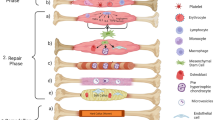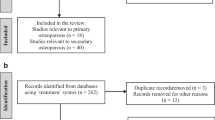Abstract
Summary
Sarcopenia is more prevalent in patients with distal radius fracture (DRF) than in age- and sex-matched controls. Lower appendicular mass index in men and weaker grip strength in both men and women increase the likelihood of DRF.
Introduction
Sarcopenia is a core component of physical frailty that predisposes older people to falls and negatively impacts the activities of daily living. The objectives of this study were to compare the prevalence of sarcopenia in patients with DRF with that in age- and sex-matched controls without DRF; and evaluate the association between sarcopenia and the occurrence of DRF.
Methods
We prospectively recruited 132 patients over 50 years of age who sustained DRF due to fall and 132 age- and sex-matched controls without DRF. A definition of sarcopenia was based on the consensus of the Asian Working Group for Sarcopenia. Sarcopenic components including appendicular lean body mass, grip strength, and gait speed were compared between the two groups. Other factors assessed for the occurrence of DRF were age, gender, body mass index (BMI), lumbar, and hip bone mineral density (BMD) values. A conditional logistic regression analysis was conducted to evaluate the associations between sarcopenia and the occurrence of DRF.
Results
A total of 39 (30%) of 132 DRF patients were sarcopenic, whereas 23 (17%) of the 132 controls were within the sarcopenic criteria (p = 0.048). The patient group had significantly lower lean body mass and weaker grip strength than those of the control group. However, there was no significant difference in gait speed between the two groups. According to regression analysis, lower appendicular mass index in men was associated with an increased incidence of DRF (odds ratio [OR] = 0.84, 95% confidence interval [CI] = 0.72, 0.95) while weaker grip strength and lower total hip BMD values were associated with the occurrence of DRF in both men (OR = 0.77, 95% CI = 0.63, 0.92; and OR = 0.79, 95% CI = 0.64, 0.94, respectively) and women (OR = 0.78, 95% CI = 0.64, 0.93, and OR = 0.73, 95% CI = 0.52, 0.92, respectively).
Conclusions
Sarcopenia is more prevalent in patients with DRF than in age- and sex-matched controls. Lower appendicular mass in men, weaker grip strength, and lower hip BMD in both men and women increase the likelihood of DRF.
Similar content being viewed by others
References
Chung KC, Shauver MJ, Birkmeyer JD (2009) Trends in the United States in the treatment of distal radial fractures in the elderly. J Bone Joint Surg Am 91(8):1868–1873
Nellans KW, Kowalski E, Chung KC (2012) The epidemiology of distal radius fractures. Hand Clin 28(2):113–125
Melton LJ 3rd, Amadio PC, Crowson CS, O’Fallon WM (1998) Long-term trends in the incidence of distal forearm fractures. Osteoporos Int 8(4):341–348
Bengner U, Johnell O (1985) Increasing incidence of forearm fractures. A comparison of epidemiologic patterns 25 years apart. Acta Orthop Scand 56(2):158–160
Nordvall H, Glanberg-Persson G, Lysholm J (2007) Are distal radius fractures due to fragility or to falls? A consecutive case-control study of bone mineral density, tendency to fall, risk factors for osteoporosis, and health-related quality of life. Acta Orthop 78(2):271–277
Koval KJ, Harrast JJ, Anglen JO, Weinstein JN (2008) Fractures of the distal part of the radius. The evolution of practice over time. Where’s the evidence? J Bone Joint Surg Am 90(9):1855–1861
Clayton RA, Gaston MS, Ralston SH, Court-Brown CM, McQueen MM (2009) Association between decreased bone mineral density and severity of distal radial fractures. J Bone Joint Surg Am 91(3):613–619
Schuit SC, van der Klift M, Weel AE, de Laet CE, Burger H, Seeman E, Hofman A, Uitterlinden AG, van Leeuwen JP, Pols HA (2004) Fracture incidence and association with bone mineral density in elderly men and women: the Rotterdam Study. Bone 34(1):195–202
Bokshan SL, DePasse JM, Daniels AH (2016) Sarcopenia in orthopedic surgery. Orthopedics 39(2):e295–e300
Cawthon PM, Marshall LM, Michael Y, Dam TT, Ensrud KE, Barrett-Connor E, Orwoll ES, Osteoporotic Fractures in Men Research G (2007) Frailty in older men: prevalence, progression, and relationship with mortality. J Am Geriatr Soc 55(8):1216–1223
Ormsbee MJ, Prado CM, Ilich JZ, Purcell S, Siervo M, Folsom A, Panton L (2014) Osteosarcopenic obesity: the role of bone, muscle, and fat on health. J Cachexia Sarcopenia Muscle 5(3):183–192
Clynes MA, Edwards MH, Buehring B, Dennison EM, Binkley N, Cooper C (2015) Definitions of sarcopenia: associations with previous falls and fracture in a population sample. Calcif Tissue Int 97(5):445–452
Di Monaco M, Vallero F, Di Monaco R, Tappero R (2011) Prevalence of sarcopenia and its association with osteoporosis in 313 older women following a hip fracture. Arch Gerontol Geriatr 52(1):71–74
Faulkner JA, Larkin LM, Claflin DR, Brooks SV (2007) Age-related changes in the structure and function of skeletal muscles. Clin Exp Pharmacol Physiol 34(11):1091–1096
Janssen I, Heymsfield SB, Ross R (2002) Low relative skeletal muscle mass (sarcopenia) in older persons is associated with functional impairment and physical disability. J Am Geriatr Soc 50(5):889–896
Lang T, Cauley JA, Tylavsky F, Bauer D, Cummings S, Harris TB, Health ABCS (2010) Computed tomographic measurements of thigh muscle cross-sectional area and attenuation coefficient predict hip fracture: the health, aging, and body composition study. J Bone Miner Res 25(3):513–519
Hong W, Cheng Q, Zhu X, Zhu H, Li H, Zhang X, Zheng S, Du Y, Tang W, Xue S, Ye Z (2015) Prevalence of sarcopenia and its relationship with sites of fragility fractures in elderly Chinese men and women. PLoS One 10(9):e0138102
Chalhoub D, Cawthon PM, Ensrud KE, Stefanick ML, Kado DM, Boudreau R, Greenspan S, Newman AB, Zmuda J, Orwoll ES, Cauley JA, Osteoporotic Fractures in Men Study Research G (2015) Risk of nonspine fractures in older adults with sarcopenia, low bone mass, or both. J Am Geriatr Soc 63(9):1733–1740
Suetta C, Magnusson SP, Rosted A, Aagaard P, Jakobsen AK, Larsen LH, Duus B, Kjaer M (2004) Resistance training in the early postoperative phase reduces hospitalization and leads to muscle hypertrophy in elderly hip surgery patients—a controlled, randomized study. J Am Geriatr Soc 52(12):2016–2022
Chen LK, Liu LK, Woo J, Assantachai P, Auyeung TW, Bahyah KS, Chou MY, Chen LY, Hsu PS, Krairit O, Lee JS, Lee WJ, Lee Y, Liang CK, Limpawattana P, Lin CS, Peng LN, Satake S, Suzuki T, Won CW, Wu CH, Wu SN, Zhang T, Zeng P, Akishita M, Arai H (2014) Sarcopenia in Asia: consensus report of the Asian Working Group for Sarcopenia. J Am Med Dir Assoc 15(2):95–101
Kanis JA, Melton LJ 3rd, Christiansen C, Johnston CC, Khaltaev N (1994) The diagnosis of osteoporosis. J Bone Miner Res 9(8):1137–1141
Watts NB, Leslie WD, Foldes AJ, Miller PD (2013) 2013 International Society for Clinical Densitometry Position Development Conference: task force on normative databases. J Clin Densitom 16(4):472–481
Petersen P, Petrick M, Connor H, Conklin D (1989) Grip strength and hand dominance: challenging the 10% rule. Am J Occup Ther 43(7):444–447
Cruz-Jentoft AJ, Landi F, Schneider SM, Zuniga C, Arai H, Boirie Y, Chen LK, Fielding RA, Martin FC, Michel JP, Sieber C, Stout JR, Studenski SA, Vellas B, Woo J, Zamboni M, Cederholm T (2014) Prevalence of and interventions for sarcopenia in ageing adults: a systematic review. Report of the International Sarcopenia Initiative (EWGSOP and IWGS). Age Ageing 43(6):748–759
Frisoli A Jr, Chaves PH, Ingham SJ, Fried LP (2011) Severe osteopenia and osteoporosis, sarcopenia, and frailty status in community-dwelling older women: results from the Women’s Health and Aging Study (WHAS) II. Bone 48(4):952–957
Blain H, Jaussent A, Thomas E, Micallef JP, Dupuy AM, Bernard PL, Mariano-Goulart D, Cristol JP, Sultan C, Rossi M, Picot MC (2010) Appendicular skeletal muscle mass is the strongest independent factor associated with femoral neck bone mineral density in adult and older men. Exp Gerontol 45(9):679–684
Tarantino U, Piccirilli E, Fantini M, Baldi J, Gasbarra E, Bei R (2015) Sarcopenia and fragility fractures: molecular and clinical evidence of the bone-muscle interaction. J Bone Joint Surg Am 97(5):429–437
Di Monaco M, Vallero F, Di Monaco R, Tappero R, Cavanna A (2007) Skeletal muscle mass, fat mass, and hip bone mineral density in elderly women with hip fracture. J Bone Miner Metab 25(4):237–242
Cheung CL, Tan KC, Bow CH, Soong CS, Loong CH, Kung AW (2012) Low handgrip strength is a predictor of osteoporotic fractures: cross-sectional and prospective evidence from the Hong Kong Osteoporosis Study. Age (Dordr) 34(5):1239–1248
Guo CB, Zhang W, Ma DQ, Zhang KH, Huang JQ (1996) Hand grip strength: an indicator of nutritional state and the mix of postoperative complications in patients with oral and maxillofacial cancers. Br J Oral Maxillofac Surg 34(4):325–327
Roberts HC, Denison HJ, Martin HJ, Patel HP, Syddall H, Cooper C, Sayer AA (2011) A review of the measurement of grip strength in clinical and epidemiological studies: towards a standardised approach. Age Ageing 40(4):423–429
Dalle Carbonare L, Giannini S (2004) Bone microarchitecture as an important determinant of bone strength. J Endocrinol Investig 27(1):99–105
Cho YJ, Gong HS, Song CH, Lee YH, Baek GH (2014) Evaluation of physical performance level as a fall risk factor in women with a distal radial fracture. J Bone Joint Surg Am 96(5):361–365
Dey DK, Bosaeus I, Lissner L, Steen B (2009) Changes in body composition and its relation to muscle strength in 75-year-old men and women: a 5-year prospective follow-up study of the NORA cohort in Goteborg, Sweden. Nutrition 25(6):613–619
Auyeung TW, Lee JS, Leung J, Kwok T, Woo J (2013) Adiposity to muscle ratio predicts incident physical limitation in a cohort of 3,153 older adults—an alternative measurement of sarcopenia and sarcopenic obesity. Age (Dordr) 35(4):1377–1385
Silman AJ (2003) Risk factors for Colles’ fracture in men and women: results from the European Prospective Osteoporosis Study. Osteoporos Int 14(3):213–218
Kelsey JL, Prill MM, Keegan TH, Tanner HE, Bernstein AL, Quesenberry CP Jr, Sidney S (2005) Reducing the risk for distal forearm fracture: preserve bone mass, slow down, and don’t fall! Osteoporos Int 16(6):681–690
Brogren E, Petranek M, Atroshi I (2007) Incidence and characteristics of distal radius fractures in a southern Swedish region. BMC Musculoskelet Disord 8:48
Dhainaut A, Daibes K, Odinsson A, Hoff M, Syversen U, Haugeberg G (2014) Exploring the relationship between bone density and severity of distal radius fragility fracture in women. J Orthop Surg Res 9:57
Webber T, Patel SP, Pensak M, Fajolu O, Rozental TD, Wolf JM (2015) Correlation between distal radial cortical thickness and bone mineral density. J Hand Surg Am 40(3):493–499
Peters DM, Fritz SL, Krotish DE (2013) Assessing the reliability and validity of a shorter walk test compared with the 10-meter walk test for measurements of gait speed in healthy, older adults. J Geriatr Phys Ther 36(1):24–30
Harber MP, Konopka AR, Douglass MD, Minchev K, Kaminsky LA, Trappe TA, Trappe S (2009) Aerobic exercise training improves whole muscle and single myofiber size and function in older women. Am J Physiol Regul Integr Comp Physiol 297(5):R1452–R1459
Morley JE, Argiles JM, Evans WJ, Bhasin S, Cella D, Deutz NE, Doehner W, Fearon KC, Ferrucci L, Hellerstein MK, Kalantar-Zadeh K, Lochs H, MacDonald N, Mulligan K, Muscaritoli M, Ponikowski P, Posthauer ME, Rossi Fanelli F, Schambelan M, Schols AM, Schuster MW, Anker SD, Society for Sarcopenia C, Wasting D (2010) Nutritional recommendations for the management of sarcopenia. J Am Med Dir Assoc 11(6):391–396
Acknowledgements
The author (YHR) has received research grant from Ewha Womans University in Korea (Ewha Womans University Research Grant of 2016), which was used for laboratory fees and salaries for baseline data collection.
Author information
Authors and Affiliations
Corresponding author
Ethics declarations
Conflict of interest
None.
Rights and permissions
About this article
Cite this article
Roh, Y.H., Koh, Y., Noh, J.H. et al. Evaluation of sarcopenia in patients with distal radius fractures. Arch Osteoporos 12, 5 (2017). https://doi.org/10.1007/s11657-016-0303-2
Received:
Accepted:
Published:
DOI: https://doi.org/10.1007/s11657-016-0303-2




